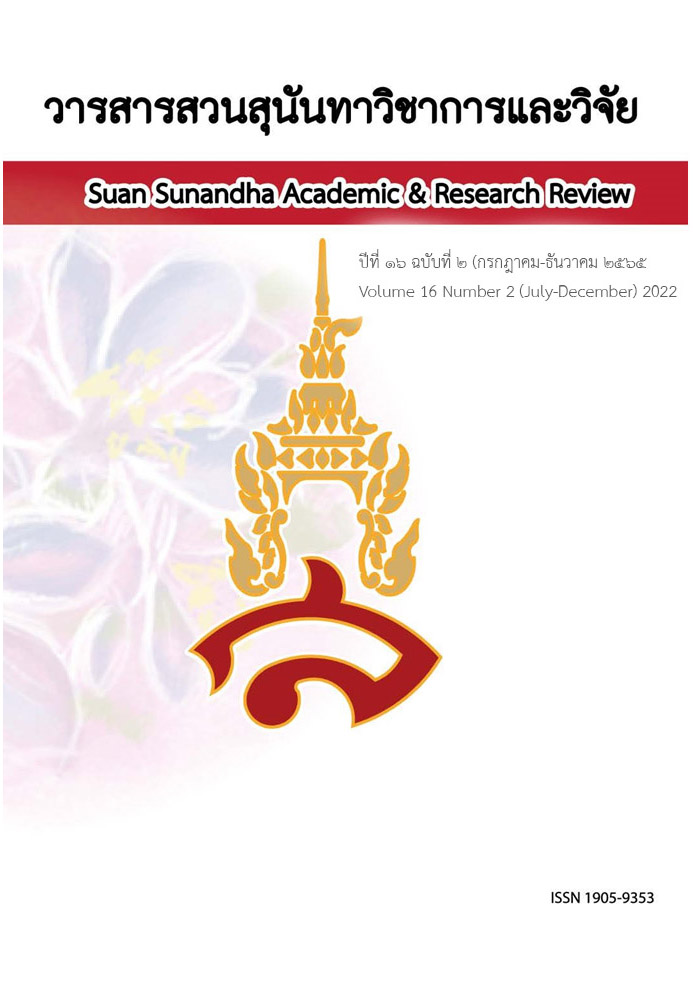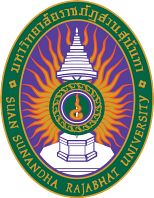Application of A Quidance Activity Set for The Development of The Emotion Regulation of Grade 8 Students
Keywords:
Guidance Activity Set, Emotion RegulationAbstract
This research aimed to develop and discover the efficiency of a guidance activity set for the development of the emotion regulation of grade 8 students as required by the 80/80 criteria, 2) compare the emotion regulation of the experimental group before and after treated with the guidance activity set, 3) compare the results of the emotion regulation of the experimental group treated with the guidance activity set with the control group treated with normal guidance activities, and 4) explore students’ opinions towards the guidance activity set. The subjects were 64 grade 8 students from two classrooms selected through cluster random sampling. The instruments included 1) a guidance activity set for the development of the emotion regulation, 2) six learning management plans, 3) an emotion regulation assessment, 4) behavioral observations on emotional regulation, and 5) interviews. Data were analyzed using mean, standard deviation, and the independent sample t-test.
The results revealed that the guidance activity set met the required criteria (81.23/83.70). The experimental group improved their emotion regulation with a statistical significance of .01, and the experimental group had higher development of the emotion regulation than the control group with a statistical significance of .05.
References
Department of Juvenile Observation and Protection. (2020). Annual Report 2020. Retrieved from http://www.djop.go.th/Djop/index.php (In Thai)
Dingle, G. A., Hodges, J., & Kunde, A. (2016). Tuned in emotion regulation program using music listening: effectiveness for adolescents in educational settings. Frontiers in Psychology, 7(1), 1-10.
Gross*, J. J., & Thompson, R. A. (2007). Emotion Regulation: Conceptual foundation. Handbook of Emotion Regulation, 3, 24.
Gross, J. (2002). Emotion regulation: Affective, Cognitive, and social consequences. Psychophysiology, 39(3), 281-291.
Gullone, E., & Taffe, J. (2011). The Emotion Regulation Questionnaire for Children and Adolescents (ERQ–CA): A Psychometric Evaluation. Psychological Assessment, 24(2), 409-417.
Khammanee, T. (2006). 14 Teaching Methods for Professional Teachers (8th ed.). Bangkok: Chulalongkorn University. (In Thai).
Lertsrimonkol, P. (2018). Effects of Emotional Regulation Training Program on Teamwork Skills of Sixth Grade Students. Degree of Master of Education (Education Psychology) Faculty of Educational, Chulalongkorn University (In Thai).
Ministry of Education. (2010). Guidelines for Organizing Student Development Activity According to The Basic Education Core Curriculum B.E.2551 (2nd ed.). Bangkok: Cooperative Union Printing (In Thai).
Phromwong, C. (2013). Developmental Testing of Media and Instructional Package. Silpakorn Educational Research Journal, 5(1), 7-20 (in Thai).
Suandusitpoll. (2017). Violence in Youth. Retrieved June 15, 2022, from https://suandusitpoll.dusit.ac.th. (In Thai)
Thanomthin, K. (2010). A Study and Development of Guidance Activities Package to Enhance Self-Control in English Study of Pratom 6 Students. Degree of Master Education (Guidance and Counseling Psychology) Faculty of Education, Srinakharinwirot University (In Thai).
Thompson, R. A. (1994). Emotion Regulation: A Them in Search of Definition. Monographs of Society for Research in Child Development, 59(2-3), 25-52.
Downloads
Published
How to Cite
Issue
Section
License
Copyright (c) 2022 Institute of Research and Development, Suan Sunandha Rajabhat University

This work is licensed under a Creative Commons Attribution-NonCommercial-NoDerivatives 4.0 International License.
บทความที่ได้รับการตีพิมพ์เป็นลิขสิทธิ์ของ สถาบันวิจัยและพัฒนา มหาวิทยาลัยราชภัฎสวนสุนันทา
ข้อความที่ปรากฏในบทความแต่ละเรื่องในวารสารวิชาการเล่มนี้เป็นความคิดเห็นส่วนตัวของผู้เขียนแต่ละท่านไม่เกี่ยวข้องกับมหาวิทยาลัยราชภัฎสวนสุนันทา และคณาจารย์ท่านอื่นๆในมหาวิทยาลัยฯ แต่อย่างใด ความรับผิดชอบองค์ประกอบทั้งหมดของบทความแต่ละเรื่องเป็นของผู้เขียนแต่ละท่าน หากมีความผิดพลาดใดๆ ผู้เขียนแต่ละท่านจะรับผิดชอบบทความของตนเองแต่ผู้เดียว


 ISSN
ISSN 


